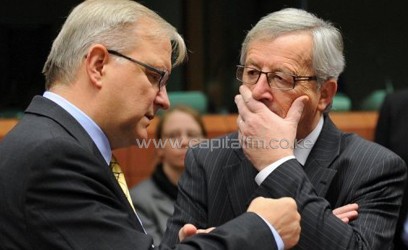
French Economy Minister Pierre Moscovici (L) speaks with Greek Finance Minister Ioannis Stournaras/AFP
But French Finance Minister Pierre Moscovici said later that the Eurogroup was “a whisker” away from a deal as Greek Prime Minister Antonis Samaras warned that eurozone stability was threatened in the absence of a deal.
Eurogroup ministers said in a statement at the end of the talks that they had not reached a deal and would meet again next Monday “for further technical work on some elements of the package”.
A day earlier, they had expressed confidence that a deal would be reached to unblock 31.2 billion euros ($40 billion) in aid to Greece and resolve a rift with the IMF over how to get the debt-stricken state’s economy back on track.
But the talks ended nearly 12 hours later, in the small hours of Wednesay morning, without the desired result.
“It was progress but we have to do a little bit more,” International Monetary Fund boss Christine Lagarde told reporters as she left the meeting.
In Asia Wednesday, the euro tumbled in the wake of the news. The single currency fell to $1.2751 and 104.30 yen after hitting highs of $1.2820 and 105.07 yen before the announcement from Brussels.
Europe’s main stock markets also fell at the start of trading on Wednesday.
London’s benchmark FTSE 100 index of top companies dropped 0.32 percent to 5,729.79 points, Frankfurt’s DAX 30 slid 0.34 percent to 7,148.91 points and in Paris the CAC 40 lost 0.22 percent to 3,454.36.
A major bone of contention was whether to give Greece, which faces a sixth year in recession, an extra two years until 2022 to arrive at a point where it can raise its own funds.
Jean-Claude Juncker, who presides the Eurogroup of finance ministers from the 17 countries that use the single currency, had called for that option but Lagarde very publicly disagreed in the run-up to the negotiations in Brussels.
“I am a little bit disappointed,” said Juncker after the talks. But he still believed a deal was possible Monday and repeated that he was “impressed” with the reforms Greece had pushed through.
“Greece has delivered. Now it’s up to us to deliver,” said Juncker.
Greek Prime Minister Antonis Samaras echoed that sentiment in a statement Wednesday.
“Our partners and the IMF have a duty to do what they have taken on,” he said.
“It’s not only the future of our country but the stability of the entire eurozone which depends on the success of the conclusion of this effort in the next few days,” he warned.
German Finance Minister Wolfgang Schaeuble said after the failed Brussels talks that “we have a better mechanism to ensure that the commitments will be respected step by step in the future”.
As the talks in Brussels began Tuesday, striking municipal workers demonstrated in Athens and occupied government buildings across Greece to protest the latest round of job losses and spending cuts.
The IMF, which along with the European Central Bank (ECB) and the EU form the troika overseeing the Greek bail-out, has argued that if Greek debt is to be sustainable in the long run, it must be reduced to 120 percent of GDP by 2020.
Failing that, the IMF says it might have to withdraw from efforts to stabilise the Greek economy.
Greece’s debt burden is currently nearly 180 percent of GDP and expected to rise to 190 percent by 2014. That is about three times the EU’s 60-percent limit and way beyond what the country can support.
One way or another then, it has to be reduced.
Juncker wants the target of 120 percent pushed back to 2022.
Greece has been waiting since June for an instalment of 31.2 billion euros in aid, part of a 130-billion-euro financial assistance package initially granted early this year.
By the end of the year, Athens is also due to receive two more aid payments, worth 5.0 and 8.3 billion euros. In return, it has pledged to implement a series of unpopular austerity budget measures.
Under the current bailout, private sector creditors agreed to write off 100 billion euros of Greek debt, and it has been suggested that official creditors should now do the same — an option the EU and the ECB have ruled out.
The ECB meanwhile cannot accept a write-down because doing so would mean in effect that it was giving a government direct financing, which its rules forbid.
Under its bailout terms, Greece was supposed to reduce its public deficit — the shortfall between government revenue and spending — to the EU limit of 3.0 percent of GDP by 2014, but last week a delay to 2016 was agreed.



































